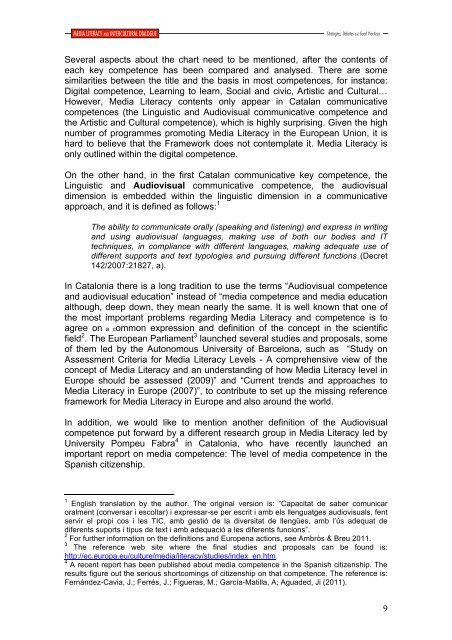Libro
Libro
Libro
Create successful ePaper yourself
Turn your PDF publications into a flip-book with our unique Google optimized e-Paper software.
MEDIA LITERACY AND INTERCULTURAL DIALOGUE<br />
Strategies, Debates and Good Practices<br />
<br />
Several aspects about the chart need to be mentioned, after the contents of<br />
each key competence has been compared and analysed. There are some<br />
similarities between the title and the basis in most competences, for instance:<br />
Digital competence, Learning to learn, Social and civic, Artistic and Cultural…<br />
However, Media Literacy contents only appear in Catalan communicative<br />
competences (the Linguistic and Audiovisual communicative competence and<br />
the Artistic and Cultural competence), which is highly surprising. Given the high<br />
number of programmes promoting Media Literacy in the European Union, it is<br />
hard to believe that the Framework does not contemplate it. Media Literacy is<br />
only outlined within the digital competence.<br />
On the other hand, in the first Catalan communicative key competence, the<br />
Linguistic and Audiovisual communicative competence, the audiovisual<br />
dimension is embedded within the linguistic dimension in a communicative<br />
approach, and it is defined as follows: 1<br />
The ability to communicate orally (speaking and listening) and express in writing<br />
and using audiovisual languages, making use of both our bodies and IT<br />
techniques, in compliance with different languages, making adequate use of<br />
different supports and text typologies and pursuing different functions (Decret<br />
142/2007:21827, a).<br />
In Catalonia there is a long tradition to use the terms “Audiovisual competence<br />
and audiovisual education” instead of “media competence and media education<br />
although, deep down, they mean nearly the same. It is well known that one of<br />
the most important problems regarding Media Literacy and competence is to<br />
agree on a common expression and definition of the concept in the scientific<br />
field 2 . The European Parliament 3 launched several studies and proposals, some<br />
of them led by the Autonomous University of Barcelona, such as “Study on<br />
Assessment Criteria for Media Literacy Levels - A comprehensive view of the<br />
concept of Media Literacy and an understanding of how Media Literacy level in<br />
Europe should be assessed (2009)” and “Current trends and approaches to<br />
Media Literacy in Europe (2007)”, to contribute to set up the missing reference<br />
framework for Media Literacy in Europe and also around the world.<br />
In addition, we would like to mention another definition of the Audiovisual<br />
competence put forward by a different research group in Media Literacy led by<br />
University Pompeu Fabra 4 in Catalonia, who have recently launched an<br />
important report on media competence: The level of media competence in the<br />
Spanish citizenship.<br />
1 English translation by the author. The original version is: “Capacitat de saber comunicar<br />
oralment (conversar i escoltar) i expressar-se per escrit i amb els llenguatges audiovisuals, fent<br />
servir el propi cos i les TIC, amb gestió de la diversitat de llengües, amb l’ús adequat de<br />
diferents suports i tipus de text i amb adequació a les diferents funcions”.<br />
2 For further information on the definitions and Europena actions, see Ambròs & Breu 2011.<br />
3<br />
The reference web site where the final studies and proposals can be found is:<br />
http://ec.europa.eu/culture/media/literacy/studies/index_en.htm<br />
4 A recent report has been published about media competence in the Spanish citizenship. The<br />
results figure out the serious shortcomings of citizenship on that competence. The reference is:<br />
Fernández-Cavia, J.; Ferrés, J.; Figueras, M.; García-Matilla, A; Aguaded, Ji (2011).<br />
9



